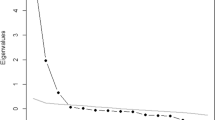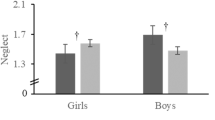Abstract
Given the connections between feelings and well-being within the family, we addressed gender differences and similarities of feelings within the family. We explored adolescents’, mothers’, and fathers’ positive and negative affect within a community sample of 224 families from the southeast of the United States. Adolescents ranged in age from 12 to 19 years. Findings suggest more gender differences in positive and negative affect for parental gender (i.e., mothers versus fathers) than for adolescent gender (i.e., boys versus girls). There were more consistent associations within the family for positive affect as opposed to negative affect. We discussed the results in the context of gender differences within the family within the family systems theoretical perspective.
Similar content being viewed by others
References
Bezirganian, S., & Cohen, P. (1992). Sex differences in the interaction between temperament and parenting. Journal of the American Academy of Child and Adolescent Psychiatry, 31, 790–801. doi:10.1097/00004583-199209000-00004.
Cowan, P. A., Powell, D., & Cowan, C. P. (1998). Parenting interventions: A family systems perspective. In I. E. Sigel & K. A. Renninger (Eds.), Handbook of child psychology (5th ed., pp. 3–72). New York: Wiley.
Dunn, J. (2004). Children’s relationships with their nonresident fathers. Journal of Child Psychology and Psychiatry, 45, 659. doi:10.1111/j.1469-7610.2004.00261.x.
Fagan, J., & Barnett, M. (2003). The relationship between maternal gatekeeping, paternal competence, mothers’ attitudes about the father role, and father involvement. Journal of Family Issues, 24, 1020–1043. doi:10.1177/0192513X03256397.
Galambos, N. L., Barker, E. T., & Almeida, D. M. (2003). Parents do matter: Trajectories of change in externalizing and internalizing problems in early adolescence. Child Development, 74, 578–594. doi:10.1111/1467-8624.7402017.
Heller, S. R., Robinson, L. C., Henry, C. S., & Plunkett, S. W. (2007). Gender differences in adolescent perceptions of parent-adolescent openness in communication and adolescent empathy. Marriage & Family Review, 40, 103–122. doi:10.1300/J002v40n04_06.
Hofferth, S. L., Cabrera, N., Carlson, M., Coley, R. L., Day, R., & Schindler, H. (2007). Resident father involvement and social fathering. In S. L. Hofferth & L. M. Casper (Eds.), Handbook of measurement issues in family research (pp. 335–374). Mahwah, NJ: Erlbaum.
Jaffee, S. R., Moffitt, T. E., Caspi, A., & Taylor, A. (2003). Life with (or without) father: The benefits of living with two biological parents depend on the father’s antisocial behavior. Child Development, 74, 109–126.
Kuczynski, L. (Ed.). (2003). Handbook of dynamics in parent-child relations. Thousand Oaks, CA: Sage Publications.
Lamb, M. E., & Lewis, C. (2004). The development and significance of father-child relationships in two-parent families. In M. E. Lamb (Ed.), The role of the father in child development (4th ed., pp. 272–306). Hoboken, NJ: Wiley.
Larson, R., & Pleck, J. (1999). Hidden feelings: Emotionality of boys and men. In D. Bernstein (Ed.), Gender and motivation: Nebraska symposium on motivation (Vol. 45, pp. 25–74). Lincoln, NE: University of Nebraska Press.
Lindsey, E. W., MacKinnon-Lewis, C., Campbell, J., Frabutt, J. M., & Lamb, M. E. (2002). Marital conflict and boys’ peer relationships: The mediating role of mother-son emotional reciprocity. Journal of Family Psychology, 16, 466–477. doi:10.1037/0893-3200.16.4.466.
McHale, J. P., & Grolnick, W. S. (Eds.). (2002). Retrospect and prospect in the psychological study of families. Mahwah, NJ: Lawrence Erlbaum Associates, Publishers.
Milevsky, A., Schlechter, M., Netter, S., & Keehn, D. (2007). Maternal and paternal parenting styles in adolescents: Associations with self-esteem, depression and life-satisfaction. Journal of Child and Family Studies, 16, 39–47. doi:10.1007/s10826-006-9066-5.
Paley, B., Conger, R. D., & Harold, G. T. (2000). Parents’ affect, adolescent cognitive representations, and adolescent social development. Journal of Marriage and the Family, 62, 761–776. doi:10.1111/j.1741-3737.2000.00761.x.
Papini, D. R., Roggman, L. A., & Anderson, J. (1991). Early-adolescent perceptions of attachment to mother and father: A test of the emotional-distancing and buffering hypotheses. The Journal of Early Adolescence, 11, 258–275. doi:10.1177/0272431691112006.
Phares, V. (1999). Poppa psychology: The role of fathers in children’s mental well-being. Westport, CT: Greenwood Publishing Group, Inc.
Phares, V., & Renk, K. (1998). Perceptions of parents: A measure of adolescents’ feelings about their parents. Journal of Marriage and the Family, 60, 646–659. doi:10.2307/353535.
Phillips, B. M., Lonigan, C. J., Driscoll, K., & Hooe, E. S. (2002). Positive and negative affectivity in children: A multitrait-multimethod investigation. Journal of Clinical Child and Adolescent Psychology, 31, 465–479.
Russell, A., & Saebel, J. (1997). Mother-son, mother-daughter, father-son, and father-daughter: Are they distinct relationships? Developmental Review, 17, 111–147. doi:10.1006/drev.1996.0431.
Silverstein, L. B. (2002). Fathers and families. In J. P. McHale & W. S. Grolnick (Eds.), Retrospect and prospect in the psychological study of families. Mahwah, NJ: Lawrence Erlbaum Associates, Publishers.
Smetana, J. G., Metzger, A., Gettman, D. C., & Campione-Barr, N. (2006). Disclosure and secrecy in adolescent-parent relationships. Child Development, 77, 201–217. doi:10.1111/j.1467-8624.2006.00865.x.
Steinberg, L. (2001). We know some things: Parent-adolescent relationships in retrospect and prospect. Journal of Research on Adolescence, 11, 1–19. doi:10.1111/1532-7795.00001.
Steinberg, L., & Silk, J. S. (2002). Parenting adolescents. In M. H. Bornstein (Ed.), Handbook of parenting Volume 1: Children and parenting (2nd ed.). Mahwah, NJ: Lawrence Erlbaum Associates, Publishers.
Stemmler, M., & Petersen, A. C. (1999). Reciprocity and change within the affective family environment in early adolescence. International Journal of Behavioral Development, 23, 185–198. doi:10.1080/016502599384062.
Tamis-LeMonda, C. S., & Cabrera, N. (Eds.). (2002). Handbook of father involvement: Multidisciplinary perspectives. Mahwah, NJ:: Lawrence Erlbaum Associates, Publishers.
Walker, A. J. (1999). Gender and family relationships. In M. Sussman, S. K. Steinmetz, & G. W. Peterson (Eds.), Handbook of marriage and the family (2nd ed., pp. 439–474). New York: Plenum Press.
Acknowledgment
Thanks are given to the MAPPS Gangs throughout the years.
Author information
Authors and Affiliations
Corresponding author
Rights and permissions
About this article
Cite this article
Phares, V., Renk, K., Duhig, A.M. et al. Gender Differences in Positive and Negative Feelings Between Adolescents and Their Fathers and Mothers. J Child Fam Stud 18, 213–218 (2009). https://doi.org/10.1007/s10826-008-9221-2
Received:
Accepted:
Published:
Issue Date:
DOI: https://doi.org/10.1007/s10826-008-9221-2




